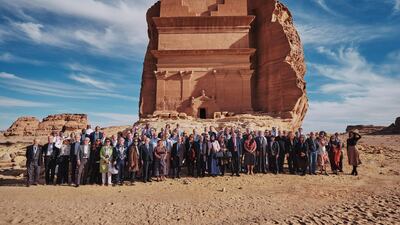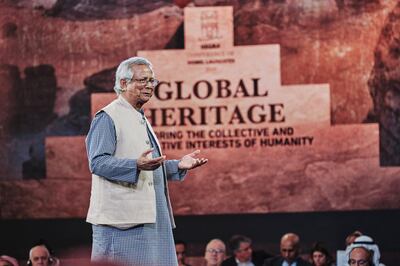Societal and economic changes in Saudi Arabia, the urgent need for climate change action and the threat of artificial intelligence were all on the agenda as 18 Nobel Laureates of peace, economics, literature, physics, chemistry, physiology and medicine gathered in the desert in kingdom's northwest.
The Hegra Conference of Nobel Laureates has previously been held in the ancient Nabataean city of Petra, but moved to AlUla this year, a site that has been a trade and cultural hub for millennia, evidenced by the tracks of the Hijaz Railway, the ruins of the ancient Dadanian capital and the striking Nabataean tombs dotting the landscape.
The former President of Poland, Lech Walesa, a Nobel Peace Prize winner in 1983 for his role in the workers' struggle for greater freedom during the Cold War, said he was impressed by the beauty of AlUla. “Due to divisions and borders I was unaware of the beauty of this area,” he said. “Through divisions, humanity has lost so much. Our generation should destroy the old order and barriers and frontiers, only then will we enjoy prosperity and be wiser.”
He added, unequivocally, that any ‘new world order’ should not be based on communist ideas, but equally so not on the “old-style rat race capitalism”, pushing for co-operation between countries.
Professor Muhammad Yunus, chairman of Grameen Bank, who became a Nobel laureate in 2006 for his pioneering approach to microfinance for Bangladesh’s poor told attendees that the world is, in his mind, facing three major issues: climate change, the distribution of wealth and AI.
Professor Yunus was impassioned when talking about AI’s threat to jobs, dismissing the suggestion that a ‘universal basic income’ is the answer.
“After all this history of human beings, is it the fate of human beings to become beggars? That’s not the life I’d want to live. Artificial intelligence could be a blessing, or a curse. My feeling is it’s moving sharply in the cursed direction.”
He added that, for him, “2020 to 2030 is the decade of the last chance.” Nobel Prize winning Mexican chemist Mario J Molina echoed this sentiment, saying that scientists “have known for some time” that climate change was an issue, but his field is always cautious with its messaging in order not to “scare people”. But he said it’s now salient that “there are tipping points connected to the earth’s climate that are amplifying each other” and that “we have to act fast.
“The Paris Agreement of 2016 is not nearly sufficient. The hope is that we can keep the temperature from increasing more than 2 degrees. 1.5 would be better, but that’s a big challenge. If we don’t act now, it could go up by 3 or 4 per cent. That would be terrible.” His primary and urgent call was to reduce the use of fossil fuels.
He added that, while much of culture and heritage deserve reverence over time, “science is different” because “we don’t trust the science of five millennia ago; that we have politicians today that don’t believe in climate change is completely unacceptable. That should be fought.”
Professor of Chemistry at the American University of Beirut, Najat Aoun Saliba reflected on the “carbon footprint we’ve all used coming to this meeting” before noting how climate change is also forcing those in drought stricken areas to abandon their own sites of cultural heritage.
The Gulf's role
While the topics discussed were broad, the theme of this year's conference was "Transmission, or Shared Heritage". "We're not going to have solutions to things like climate change or religious conflict without the deep inclusion of the Gulf area," Ambassador Josette Sheeran, the president of the Asia Society told The National. "The Gulf has played a huge part in helping meet the needs of people in war zones. I've worked particularly closely with the UAE, everywhere from Pakistan to Kenya to Haiti."
Sheeran was pivotal in bringing the Middle East into the Asia Society’s jurisdiction, and worked as Economic Deputy for Condoleezza Rice in the mid-2000s.
“The young women of [Saudi Arabia] are so highly educated that I think they’re going to change not only this world, but the world. People are making a mistake if they say, ‘oh these are just political statements and it’s not really changing’. You have to come and you have to feel it for yourself and make your own judgment. The cafes I go to in Saudi Arabia are alive with debate, and people are on fire to define what the future Saudi Arabia looks like.”
The conference was hosted by Saudi Arabia's Minister of Culture and governor of The Royal Commission of AlUla, Prince Badr bin Abdullah and was curated by Richard Attias, who also helps organise Riyadh's Future Investment Initiative.
Attias emphasised that the event is about a lot more than “the exchanging of ideas on a stage.”
“In the past 36 hours, multiple ideas have come up, so how do you turn these into outcomes and deliverables, with a roadmap? In the next couple of days I hope we will have formed a committee between people from the conference, and the organiser, His Highness.
“They can then come together and pinpoint the two or three ideas that can realistically be turned into initiatives. These will become the Hegra conference initiatives, and my suggestion is to, ASAP, build a Conference of Hegra secretariat.”
"The smartest people are very humble, and I think if we have the opportunity to build a bridge between all of these Nobel Laureates, who are all very open to the Kingdom, and the young people of Saudi Arabia, that would be amazing.
“Maybe by starting scholarship or fellowship programmes. If we can give the opportunity for people from Saudi, and from the region, to spend a few months with these great minds, to spend a few months in their labs, it will be a game changer.”
Dr Abdullah Al Rabeeah, supervisor general of the King Salman Humanitarian Aid and Relief Centre and the former Minister of Health passionately asked all of the attendees to propose and push for the UN’s official development assistance rate to move from 0.7 per cent of gross national income to 1.5 per cent.
He also pushed for more countries to act as donors, saying the bulk of aid comes from the GCC, the UK, Europe and America: “Today, less than 10 per cent of countries donate to the rest of the world. There are many wealthy countries who don’t add value to the needy. If we don’t help those in need, it will create conflict, no matter what else we do.”


